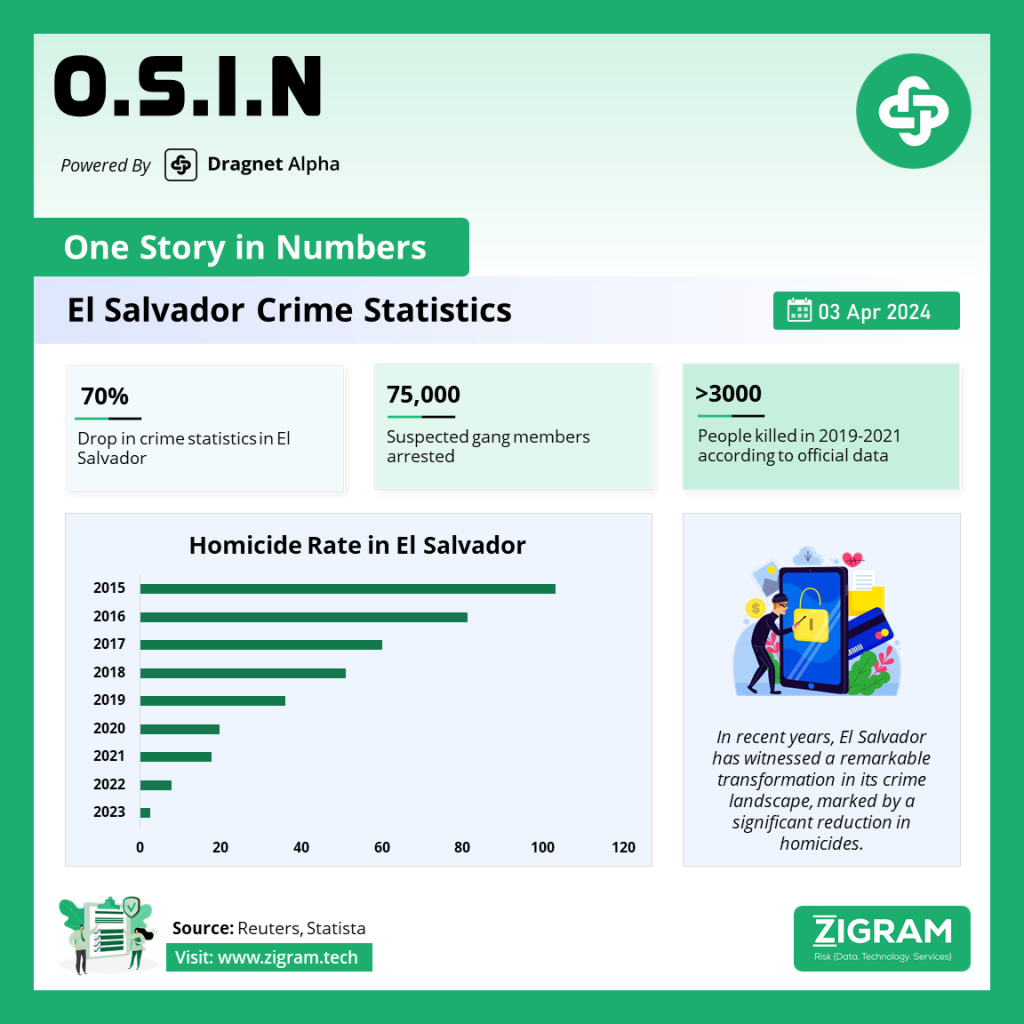Published Date:
In recent years, El Salvador has witnessed a remarkable transformation in its crime landscape, marked by a significant reduction in homicides. This shift, coupled with persistent economic challenges, paints a complex picture of the Central American nation’s current state.
Crime Reduction and Emerging Trends
One of the most striking developments in El Salvador has been the decline in homicide rates since 2015. From a staggering 103 homicides per 100,000 inhabitants in 2015, the rate plummeted to approximately 2.4 per 100,000 inhabitants in 2023. This downward trend reflects concerted efforts by authorities to tackle violence and improve security across the country.
The reduction in homicides has led to a notable shift in crime in El Salvador. While lethal offenses are on the decline, non-lethal crimes and material-related transgressions have become more prevalent. This trend underscores the changing dynamics of criminal activity, with a greater emphasis on property crimes and non-violent offenses. Importantly, this transition has also led to a decline in femicides and overall victimization rates, contributing to a perception of increased safety within the country.
Despite these positive developments, a sense of caution persists among the population. Nearly half of Salvadorans remain apprehensive about falling victim to criminal activities, highlighting the ongoing need for comprehensive security measures and crime prevention strategies.
Economic Challenges and Recovery Efforts
Alongside security improvements, El Salvador continues to grapple with persistent economic challenges. Following a period of elevated inflation, the country faces issues with the affordability of essential food items, particularly impacting roughly 20 % of the population living in poverty. The rising cost of living exacerbates socioeconomic disparities, making it increasingly difficult for vulnerable communities to access necessities.
Unemployment remains a pressing concern in El Salvador, with one out of every two individuals still seeking gainful employment opportunities. Furthermore, approximately 60 % of the population expresses apprehension about job loss, highlighting the precarious nature of employment stability. The COVID-19 pandemic has further exacerbated these challenges, leading to a substantial downturn in the economy and exacerbating existing vulnerabilities.
In response to these economic pressures, the government is prioritizing initiatives aimed at enhancing employment opportunities and stimulating economic growth. Efforts to boost the employment rate and GDP are underway, albeit with a recognition of the gradual nature of the recovery process. Investments in infrastructure, education, and social programs are key components of the government’s strategy to address unemployment and promote inclusive economic development.
Moving Forward: Addressing Challenges and Building Resilience
As El Salvador navigates the complexities of crime reduction and economic recovery, addressing underlying social and structural issues remains paramount. Sustainable progress hinges on comprehensive approaches that prioritize security, economic opportunity, and social inclusion. Strengthening institutions, investing in education and vocational training, and fostering entrepreneurship are critical steps toward building a more resilient and prosperous future for all Salvadorans.
In confronting these challenges, collaboration between government agencies, civil society organizations, and international partners will be essential. By working together to address the multifaceted issues facing the country, El Salvador can chart a path toward sustainable development and improved quality of life for its citizens.
- #ElSalvador
- #CrimeReduction
- #EconomicChallenges
- #SecurityReform
- #PovertyAlleviation
- #Unemployment
- #COVID19Recovery
- #SocialInclusion
- #EconomicDevelopment
- #ResilienceBuilding
